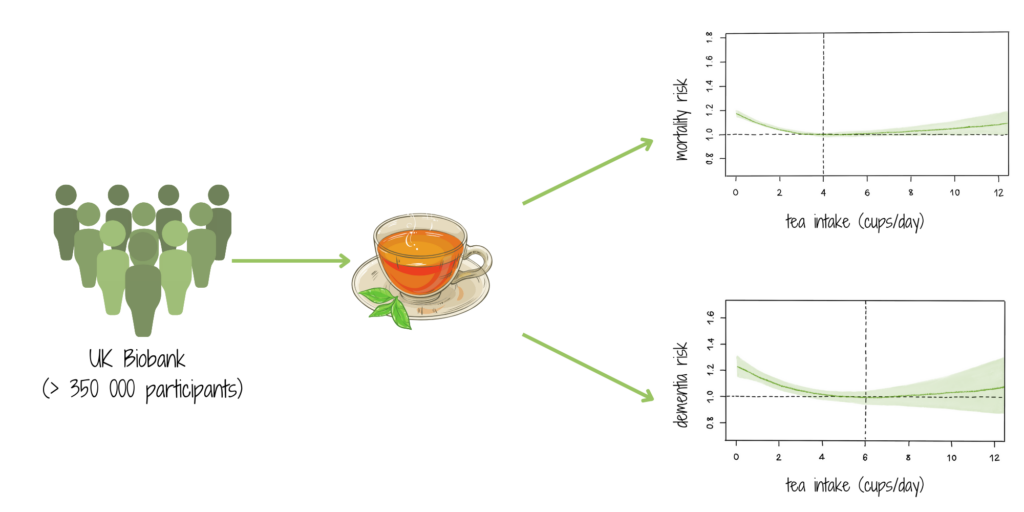
Major points:
- Two scientific studies by the Neatic team examined whether tea consumption is linked to mortality and dementia risks in over 350,000 people.
- The lowest mortality risk was observed with 4 cups of tea per day, while non-tea drinkers had an 18% higher risk (upper figure). The lowest dementia risk was seen with 6 cups of tea per day, and non-tea drinkers had a 23% higher risk (lower figure).
- These studies support Neatic’s approach of not restricting tea consumption. Tea may have beneficial effects on longevity and dementia prevention, but further research is needed.
What do we know about tea?
For the German Nutrition Society (DGE), up to 4 cups of tea per day are considered safe for adults. However, there are no official guidelines on how much tea should be consumed.
Tea contains several compounds considered beneficial for health, including polyphenols from the group of secondary plant substances. These may have positive effects on the cardiovascular system and protect against certain types of cancer. Additionally, tea is rich in fluoride, which promotes dental health. The caffeine in tea gives it an energizing effect similar to coffee.
Indeed, several studies suggest that moderate tea consumption may be linked to a lower risk of type 2 diabetes, coronary heart disease, and some cancers.
What do the studies investigate?
One of the studies conducted by the Neatic team focused on dementia, a progressive disease that leads to the deterioration of cognitive functions like memory, thinking, language, motor skills, and personality. Since there is no cure for dementia, researchers are investigating dietary factors that may prevent or slow its development.
Both studies analyzed data from over 350,000 participants in the large UK Biobank study. At the time of the analysis, more than 20,000 participants had passed away, and over 4,000 had developed dementia. The first study examined the relationship between tea consumption and mortality, while the second explored whether tea consumption is linked to dementia risk. Various factors like age, sex, income, and education were considered in all analyses.
What did the studies find?
Tea consumption showed a clear connection with mortality risk. Statistically, the lowest risk of death was observed with 4 cups of tea per day. Compared to this, non-tea drinkers had an 18% higher mortality risk. There were no indications that consuming more than 4 cups of tea per day increased mortality risk (upper figure).
The study also explored whether tea consumption was linked to specific causes of death. Tea drinkers had a lower risk of death from both cancer-related and non-cancer-related diseases. Additionally, the risk of dying from cardiovascular diseases (e.g., heart attacks) was lower in those who drank 4 or more cups of tea compared to non-tea drinkers.
Similarly, tea consumption was strongly linked to a lower risk of dementia. The lowest dementia risk was observed in those who consumed 6 cups of tea per day. Compared to this group, non-tea drinkers had a 23% higher dementia risk. There was no evidence that drinking more than 6 cups of tea per day increased dementia risk (lower figure).
What are the conclusions of the studies?
These studies support Neatic’s approach of not restricting tea consumption. Tea may even have life-extending effects and help protect against dementia. However, further studies are needed to confirm these findings. It also remains unclear whether all types of tea have the same effects on lifespan and dementia. Since these studies were conducted with British data, it is assumed that black tea was the most commonly consumed type.
Tea and coffee are both popular drinks. Here you can find out what influence coffee has on the risk of death and dementia.
Bibliography:
Deutsche Gesellschaft für Ernährung e.V. (2018): Wasser trinken – fit bleiben. Available online at https://www.dge-medienservice.de/media/productattach/File-1523011430.pdf, checked on 12/16/2023.
Redaktion Pflanzenforschung.de (2011): Tee – die unbekannte Vielfalt in der Tasse. Available online at https://www.pflanzenforschung.de/de/pflanzenwissen/journal/tee-die-unbekannte-vielfalt-der-tasse-1121, checked on 5/21/2025.
Schaefer, Sylva M.; Kaiser, Anna; Behrendt, Inken; Eichner, Gerrit; Fasshauer, Mathias (2022a): Association of alcohol types, coffee and tea intake with mortality: prospective cohort study of UK Biobank participants. Br J Nutr 129 (1), pp. 1–11. DOI: 10.1017/S000711452200040X.
Schaefer, Sylva Mareike; Kaiser, Anna; Behrendt, Inken; Eichner, Gerrit; Fasshauer, Mathias (2022b): Association of Alcohol Types, Coffee, and Tea Intake with Risk of Dementia: Prospective Cohort Study of UK Biobank Participants. Brain Sci 12 (3). DOI: 10.3390/brainsci12030360.
